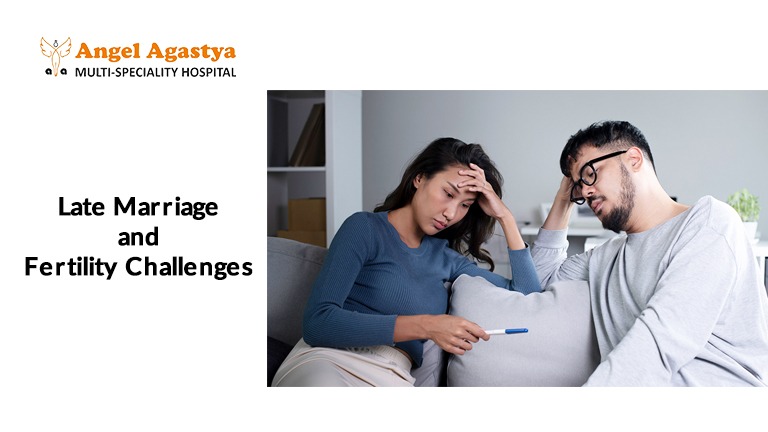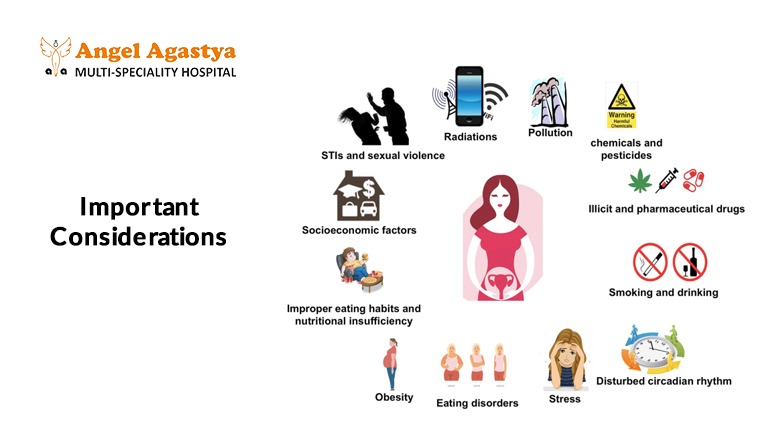Can Late Marriages Lead to Infertility?

Wondering how late marriage and fertility are connected? While tying the knot later in life comes with career stability and emotional maturity, it may also bring unexpected challenges for conception. Discover the surprising benefits, hidden risks, and expert-backed strategies to maintain reproductive health, no matter when you say “I do”!
Intoduction
In today’s fast-paced world, many couples are choosing to delay marriage to pursue education, establish careers, and achieve personal goals. While this trend offers numerous personal and professional advantages, it is natural to wonder about the potential impact on fertility. One common question that arises is: Can late marriages lead to infertility?
Understanding the Link Between Age and Fertility

Both male and female fertility decline with age, although the impact is more pronounced in women. To better understand the correlation between age and fertility, let’s explore how reproductive health changes over time for both genders.
Female Fertility and Age
Egg Quality and Quantity
Women are born with a finite number of eggs, known as their ovarian reserve. Unlike sperm production in men, which continues throughout life, women do not produce new eggs. Over time, the quantity and quality of eggs decline.
- In the early 20s, a woman’s fertility is at its peak.
- By the late 20s and early 30s, fertility starts to gradually decline.
- After the age of 35, the decline becomes more pronounced.
- By the time a woman reaches her 40s, the chances of natural conception drop significantly due to diminished ovarian reserve and increased risk of chromosomal abnormalities in eggs.
Reduced Ovulation
As women age, ovulation may become less regular and more unpredictable. Hormonal fluctuations can lead to anovulatory cycles (cycles where ovulation does not occur), making conception more challenging. A lack of regular ovulation can significantly affect the chances of getting pregnant, even if a woman is still menstruating.
Increased Risk of Age-Related Conditions
Several age-related conditions can affect female fertility:
- Endometriosis: A condition where tissue similar to the uterine lining grows outside the uterus, which can interfere with ovulation, egg quality, and implantation.
- Uterine Fibroids: Non-cancerous growths in the uterus that can affect implantation and pregnancy.
- Pelvic Inflammatory Disease (PID): Often caused by untreated infections, PID can lead to scarring in the reproductive organs, making conception difficult.
- Diminished Ovarian Reserve (DOR): A condition where the number of viable eggs is lower than expected for a woman’s age.
Male Fertility and Age
While men continue to produce sperm throughout their lives, sperm quality does decline with age. Research suggests that after the age of 40, sperm count, motility (the ability of sperm to move), and morphology (sperm shape) may deteriorate. These changes can reduce the chances of successful fertilization.
Factors Contributing to Male Infertility
- Decreased Sperm Quality: Older men tend to produce sperm with higher DNA fragmentation, which may lead to failed fertilization or miscarriage.
- Hormonal Changes: Testosterone levels gradually decline with age, affecting libido and sperm production.
- Increased Risk of Genetic Mutations: Advanced paternal age is associated with a higher risk of genetic disorders such as autism and schizophrenia in offspring.
- Lifestyle Factors: Smoking, excessive alcohol consumption, obesity, and exposure to environmental toxins can accelerate the decline of sperm quality.
Late Marriage and Fertility Challenges
Late marriage itself does not directly cause infertility, but it does increase the likelihood of encountering fertility challenges. Here’s why:

1. Reduced Fertility Window
Delaying marriage reduces the overall window of opportunity for conception, especially for women. Women in their 20s and early 30s generally have the highest fertility rates. As fertility declines after the mid-30s, couples who start trying to conceive later in life may have a smaller window to achieve pregnancy naturally.
2. Increased Risk of Age-Related Fertility Decline
If a couple delays marriage and attempts to conceive later in life, they may face increased challenges due to the age-related decline in fertility.
- Women who marry in their late 30s or early 40s may have a harder time conceiving naturally due to diminished ovarian reserve and irregular ovulation.
- For men, aging affects sperm health, increasing the risk of infertility and pregnancy complications.
3. Higher Likelihood of Pregnancy Complications
Pregnancy at an advanced age carries a higher risk of complications, including:
- Miscarriage due to poor egg or sperm quality.
- Gestational diabetes and hypertension during pregnancy.
- Increased risk of birth defects due to chromosomal abnormalities.
- Higher chances of requiring assisted reproductive technologies (ART) such as IVF to conceive.
4. Potential for Age-Related Medical Conditions
As both men and women age, they are more likely to develop chronic conditions such as diabetes, hypertension, and thyroid disorders, which can negatively impact fertility. In women, polycystic ovary syndrome (PCOS) and premature ovarian failure can further complicate conception.
Important Considerations

1. Individual Variability
It’s crucial to remember that individual experiences vary greatly. Some couples who marry later in life conceive easily, while others may face difficulties. Genetics, lifestyle, and overall health play a significant role in fertility.
2. The Role of Lifestyle Choices in Fertility
Adopting a healthy lifestyle can improve fertility and overall reproductive health. Key lifestyle factors include:
- Maintaining a healthy weight.
- Eating a balanced diet rich in antioxidants, folic acid, and omega-3 fatty acids.
- Exercising regularly but avoiding excessive high-intensity workouts that can disrupt hormonal balance.
- Reducing stress through mindfulness, yoga, and relaxation techniques.
- Avoiding smoking, excessive alcohol consumption, and recreational drugs.
3. Advancements in Fertility Treatment
Modern medicine offers several options to help couples struggling with fertility challenges, including:
- In Vitro Fertilization (IVF): A widely used procedure where eggs are retrieved, fertilized in a lab, and implanted in the uterus.
- Intrauterine Insemination (IUI): A less invasive technique where sperm is placed directly into the uterus to facilitate fertilization.
- Egg and Sperm Freezing: Many individuals choose to freeze their eggs or sperm at a younger age to preserve fertility for future use.
- Ovulation Induction Medications: Drugs such as Clomid and Letrozole can help stimulate ovulation in women with irregular cycles.
- Donor Eggs and Sperm: Couples facing severe infertility challenges can explore donor options.
Conclusion
While delaying marriage may increase the likelihood of encountering fertility challenges, it does not guarantee infertility. Fertility is influenced by multiple factors, including genetics, lifestyle choices, and overall health. By understanding the potential impact of age on fertility and taking proactive steps such as maintaining a healthy lifestyle, undergoing regular health check-ups, and exploring fertility preservation options, couples can improve their chances of conceiving, regardless of when they choose to marry.
Ultimately, late marriages do not mean the end of parenthood. With advancements in reproductive medicine and a conscious approach to health and fertility, couples can navigate the journey of parenthood successfully, no matter when they start.
Frequently Asked Questions (FAQs) on Late Marriage and Fertility
1. Does late marriage always lead to infertility?
No, late marriage and fertility challenges are not directly correlated, but age can impact reproductive health. While many couples conceive naturally despite marrying late, fertility naturally declines with age, particularly for women. Women are born with a finite number of eggs, and their quality diminishes over time. Similarly, men experience a gradual decline in sperm quality, which can affect conception. However, modern medical advancements offer solutions for those facing fertility challenges due to late marriage.
2. How does late marriage affect female fertility?
Late marriage and fertility concerns for women arise mainly because the ovarian reserve (number of eggs) decreases with age. As a woman ages, the quality of her eggs also deteriorates, making fertilization and implantation more difficult. Additionally, late marriage may lead to irregular ovulation, increased risk of hormonal imbalances, and a higher likelihood of conditions such as endometriosis and polycystic ovary syndrome (PCOS), which can affect fertility. Women who marry late should consider consulting a fertility specialist for early assessment and guidance.
3. Can men also experience fertility issues due to late marriage?
Yes, late marriage and fertility issues are not limited to women; men also experience age-related reproductive decline. While men continue to produce sperm throughout their lives, aging can affect sperm quality, motility (movement), and morphology (shape). Older fathers have an increased risk of passing genetic mutations to offspring, which can lead to developmental disorders. Lifestyle factors such as smoking, alcohol consumption, and stress further impact male fertility in late marriage scenarios.
4. What are the risks of conceiving after 35?
One of the biggest concerns in late marriage and fertility is the increased difficulty in conceiving after the age of 35. Women over 35 experience a decline in egg quality, which can lead to a higher risk of miscarriage and pregnancy complications such as gestational diabetes, high blood pressure, and chromosomal abnormalities like Down syndrome. Additionally, labor complications and the need for medical interventions such as C-sections become more common. However, with proper medical guidance and prenatal care, many women successfully conceive and deliver healthy babies.
5. Are there medical solutions for late marriage and fertility challenges?
Yes, various medical treatments are available to address late marriage and fertility challenges. Assisted Reproductive Technologies (ART) such as In Vitro Fertilization (IVF) and Intrauterine Insemination (IUI) help couples who struggle to conceive naturally. Fertility medications can regulate ovulation and improve egg quality. Additionally, hormone therapy and ovarian stimulation techniques can enhance fertility outcomes for couples marrying late. Consulting a fertility specialist at the right time can improve the chances of conception.
6. Can lifestyle changes improve fertility in late marriages?
Yes, lifestyle plays a crucial role in late marriage and fertility. A well-balanced diet rich in antioxidants, vitamins, and minerals can improve egg and sperm health. Regular physical activity boosts blood circulation to reproductive organs and balances hormone levels. Avoiding smoking, excessive alcohol consumption, and reducing stress through meditation or yoga can significantly improve fertility. Maintaining a healthy weight is also essential, as both obesity and being underweight can disrupt reproductive functions.
7. Is egg or sperm freezing a good option for those delaying marriage?
Yes, egg and sperm freezing are excellent options for individuals concerned about late marriage and fertility. Women in their 20s or early 30s can freeze their eggs to preserve their fertility potential for later use. This ensures that high-quality eggs are available when they are ready to conceive, reducing the risks associated with age-related fertility decline. Similarly, men can freeze sperm to preserve their reproductive health, especially if they plan to marry late. Egg and sperm freezing provide an opportunity for future conception with a lower risk of infertility.
8. What role does stress play in late marriage and fertility?
Stress has a significant impact on late marriage and fertility, as chronic stress disrupts hormonal balance, leading to irregular ovulation in women and reduced sperm quality in men. Stress-induced hormonal changes can affect reproductive function, making conception more difficult. High levels of cortisol (the stress hormone) interfere with reproductive hormones such as estrogen, progesterone, and testosterone. Stress management techniques like mindfulness, yoga, meditation, and adequate sleep can improve fertility outcomes for couples facing stress due to late marriage.
9. Can assisted reproductive technologies (ART) help late marriages?
Yes, late marriage and fertility issues can be effectively addressed through Assisted Reproductive Technologies (ART). IVF (In Vitro Fertilization) involves fertilizing an egg with sperm outside the body and implanting it into the uterus, increasing the chances of pregnancy. IUI (Intrauterine Insemination) is a less invasive method where sperm is directly placed into the uterus during ovulation. These technologies provide viable options for couples who face difficulties in conceiving naturally due to age-related fertility decline.
10. Should couples consult a doctor before planning pregnancy in late marriage?
Yes, preconception counseling is essential for couples concerned about late marriage and fertility. A fertility specialist can assess reproductive health through tests such as ovarian reserve testing, semen analysis, and hormonal evaluations. Early diagnosis of potential fertility challenges allows couples to explore medical options such as fertility treatments, egg or sperm freezing, and lifestyle changes. Seeking medical guidance before trying to conceive can help increase the chances of a healthy pregnancy.

